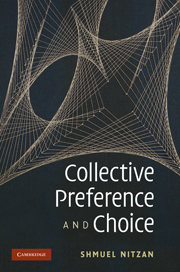Book contents
- Frontmatter
- Contents
- List of figures
- Preface
- Acknowledgments
- Part I Introduction
- Part II Different Preferences
- 4 Do social preferences exist? Arrow's and Sen's impossibility theorems
- 5 The desirable decision rule: axiomatization
- 6 Rule selection based on compromise with the unanimity criterion
- 7 Paradoxes of voting
- 8 Majority tyranny
- 9 The problem of inefficient provision of public goods
- 10 Do individuals reveal their true preferences?
- Part III Identical Preferences, Different Decisional Skills
- Bibliography
- Author index
- Subject index
4 - Do social preferences exist? Arrow's and Sen's impossibility theorems
Published online by Cambridge University Press: 05 June 2012
- Frontmatter
- Contents
- List of figures
- Preface
- Acknowledgments
- Part I Introduction
- Part II Different Preferences
- 4 Do social preferences exist? Arrow's and Sen's impossibility theorems
- 5 The desirable decision rule: axiomatization
- 6 Rule selection based on compromise with the unanimity criterion
- 7 Paradoxes of voting
- 8 Majority tyranny
- 9 The problem of inefficient provision of public goods
- 10 Do individuals reveal their true preferences?
- Part III Identical Preferences, Different Decisional Skills
- Bibliography
- Author index
- Subject index
Summary
In the context of social choice, the concepts of social preference relation and social choice function must be examined. The relationship between these concepts and the preference relations of the individuals in society must then be clarified. The central normative question is: what is the “desirable” social preference relation? One answer to this question is based on agreement regarding the desirable properties of the appropriate social preference relation, because such agreement can result in the unequivocal identification of this relation, and in turn, the appropriate social choice function. This approach is called the axiomatic approach. Its success may enable society to take action, even in situations where there is a conflict of interests among its members. This is a key normative issue, of major concern to any society that seeks to adopt a decision rule that reflects its preferences. Clearly, coping with this issue is a major challenge for social choice theory and in fact, for any theory that is concerned with the study of social behavior or with the search for an appropriate method of social choice.
A fundamental positive question, that was of major concern to researchers of social choice, is whether social choice, like individual choice, can be rationalized by some reasonable preference relation. The existence of such a relation, and of a social choice function that can be rationalized by this relation, guarantees rational social behavior.
- Type
- Chapter
- Information
- Collective Preference and Choice , pp. 35 - 59Publisher: Cambridge University PressPrint publication year: 2009



